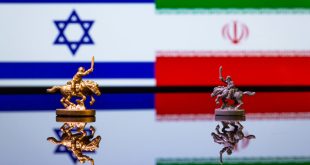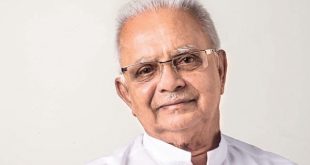Long on rhetoric and short of solid answers, the maiden speech of US President Barack Obama at the United Nations was not only a big disappointment but also an indication that his foreign policy was as detestable as that of his much-criticised predecessor, George W. Bush.
Much was expected from Obama in his first UN speech dubbed the State of the World address, but the undercurrents are that the world peace will be as elusive as it had been during the eight-year-long Bush era.
Obama’s performance at the UN suggests that he is now toeing the Israeli line or the policy prescribed by the American-Israeli Public Affairs Committee (AIPAC) – better known as the Jewish Lobby in America.
There was no tough message to Israel. Ramboism was directed largely at Iran: Either Teheran should give up its nuclear programme or face the consequences.
Obama seems to be maturing in politics as the gap between what he says and what he does widens, be it America’s policy on torture, the legal rights of the Guantanamo detainees, the Iraq withdrawal or his West Asia peace drive.
Take for instance, what he said in his speech at the UN and how he handled the summit with the leaders of Israel and the Palestinian Authority.
In his UN speech, he hailed Palestinian efforts on security. But he also praised the Zionist state, saying Israeli facilitation of greater freedom of movement for Palestinians would lead to economic growth in the occupied West Bank.
 “But more progress is needed. We continue to call on Palestinians to end incitement against Israel… And we continue to emphasise that America does not accept the legitimacy of continued Israeli settlements… The time has come to re-launch negotiations without conditions that address issues such as security for Israelis and Palestinians, borders, refugees and Jerusalem. The goal is clear. Two states living side-by-side in peace and security.”
“But more progress is needed. We continue to call on Palestinians to end incitement against Israel… And we continue to emphasise that America does not accept the legitimacy of continued Israeli settlements… The time has come to re-launch negotiations without conditions that address issues such as security for Israelis and Palestinians, borders, refugees and Jerusalem. The goal is clear. Two states living side-by-side in peace and security.”
Hasn’t Obama been saying this mantra since he came to the White House? There is little new in it, besides the reiteration. Though the speech was great and had a message in it for Israel, the reality was something different.
A day before the speech, he met Israeli Prime Minister Benjamin Netanyahu and Palestinian Authority President Mahmoud Abbas at a tripartite summit in New York on the sidelines of the UN sessions. Many in the Arab world, especially Obama fans who think he is different and not like Bush, expected that the talks would produce a breakthrough and the US president would be tough on Netanyahu for not heeding his advice seriously. But it was not Obama who roared at the Waldorf-Astoria hotel, but the Israeli Prime Minister.
Obama in his Cairo speech to the Muslim world insisted that Israel must freeze all settlement building activity in the occupied Palestinian land. He later made it a necessary condition for any summit-level meeting. He was quite serious with the demand or so it seemed. Netanyahu and many in Israel wondered whether the United States was abandoning them. But the New York meeting took place without any conditions, giving Netanyahu a major victory.
Netanyahu can now tell his supporters at home, “Folks, have no fear. Obama is just another US president who cannot tell Israel what it should do.”
Netanyahu came to power promising that he would continue to build settlements in the occupied Palestinian land. Obama, by dropping his condition, has given a licence to Netanyahu to rob the Palestinian land till the coming of the Messiah.
Obama is a realist. He apparently knows that he cannot survive in politics or get re-elected if he gets tough on Israel or work against Israel’s interests. This week, the US and Israel carried out a joint military exercise, underscoring the strategic partnership between the two nations. What’s more? The Obama administration came to the rescue of Israel when a UN report said there was evidence that Israel had committed war crimes during its attack on Gaza in January this year. A White House official said the Obama administration would use its veto at the UN Security Council if there were moves to take Israel before the International Criminal Court (ICC) while Susan Rice, US ambassador at the UN, described the UN report as “unbalanced, one-sided and basically unacceptable”.
The shift in the US policy also comes against the backdrop of a secret meeting Israeli Prime Minister Netanyahu had with Russian President Dimitry Medvedev in Moscow recently. Reports said Netanyahu went to Moscow to stop Russians selling advanced weapons to Iran and Syria. But not many analysts would buy this story. The truth remained a secret till Wednesday when Medvedev, in a shocking policy shift, extended his support for US-Israeli moves aimed at bringing in tougher UN sanctions on Iran.
Russia’s change of policy also comes in the wake of another diplomatic move that puts the emerging picture in perspective — Obama’s decision to scrap the missile defence project in Europe. Needless to say, Russia, which saw the missile defence project as a threat to its national security, hailed Obama’s move. But in international politics, nobody scratches another’s back for nothing. The deal appears to be that Russia would back US moves against Iran or would not get involved if Israel attacks Iran’s nuclear facilities.
Betrayed by the Russians, Iran might do well to get back to the foreign policy of Ayatollah Ruhullah Khomeini, the founder of the Islamic Republic. The Ayatollah regarded both the US and Russia (then the Soviet Union) as evil forces and declared that “neither east, nor west, Islam is the best”.
Iran must also be wary of China. Although Beijing, which has virtually performed the final rites on Mao Zedong’s socialist vision, usually defends allies at the UN Security Council, it would not take up arms for them. If cajoled by the United States, Beijing may also abandon Iran. If Iran thinks China is a true friend, then Beijing must tell the US that any nuclear non-proliferation move should begin with Israel, which is said to possess some 300 nuclear warheads or the US and all the other nuclear powers should set an example by dismantling their nuclear arsenals.
Well, hypocrisy is part and parcel of big power politics where there are no permanent friends, only permanent interests. In this context Libyan leader Muammar Gaddafi’s maiden speech at the UN General Assembly on Wednesday makes much sense.
He said veto-wielding nations of the Security Council – the United States, Russia, Britain, France and China — were ignoring the views of the full 192 members of the General Assembly and the principles of the UN charter.
“The Security Council did not provide us with security but with terror and sanctions… The preamble [of the charter] says all nations are equal whether they are small or big, but the veto of the permanent members of the council undermines this concept,” he said.
He also symbolically tore the UN charter and threw over his back a paperback copy of the charter as if to say that the charter was not worth the paper it had been written on.
The Libyan leader said the Security Council had failed to prevent or intervene in 65 wars that had taken place since the UN was set up in 1945.
“How can we be happy about the world security if the world is controlled by four or five powers? We are just like a décor…Now, brothers, there is no respect for the United Nations, no regard for the General Assembly,” he said adding that it was the General Assembly which should be calling the shots – not the Security Council.
However much leaders like Gaddafi call for UN reforms, the Permanent Five or the so-called big heads in world politics would not agree to part with their powers. One option is the formation of a rival body by states which are not happy with an undemocratic United Nations.
 Sri lanka Muslims Web Portal Diversity and Inclusiveness
Sri lanka Muslims Web Portal Diversity and Inclusiveness



